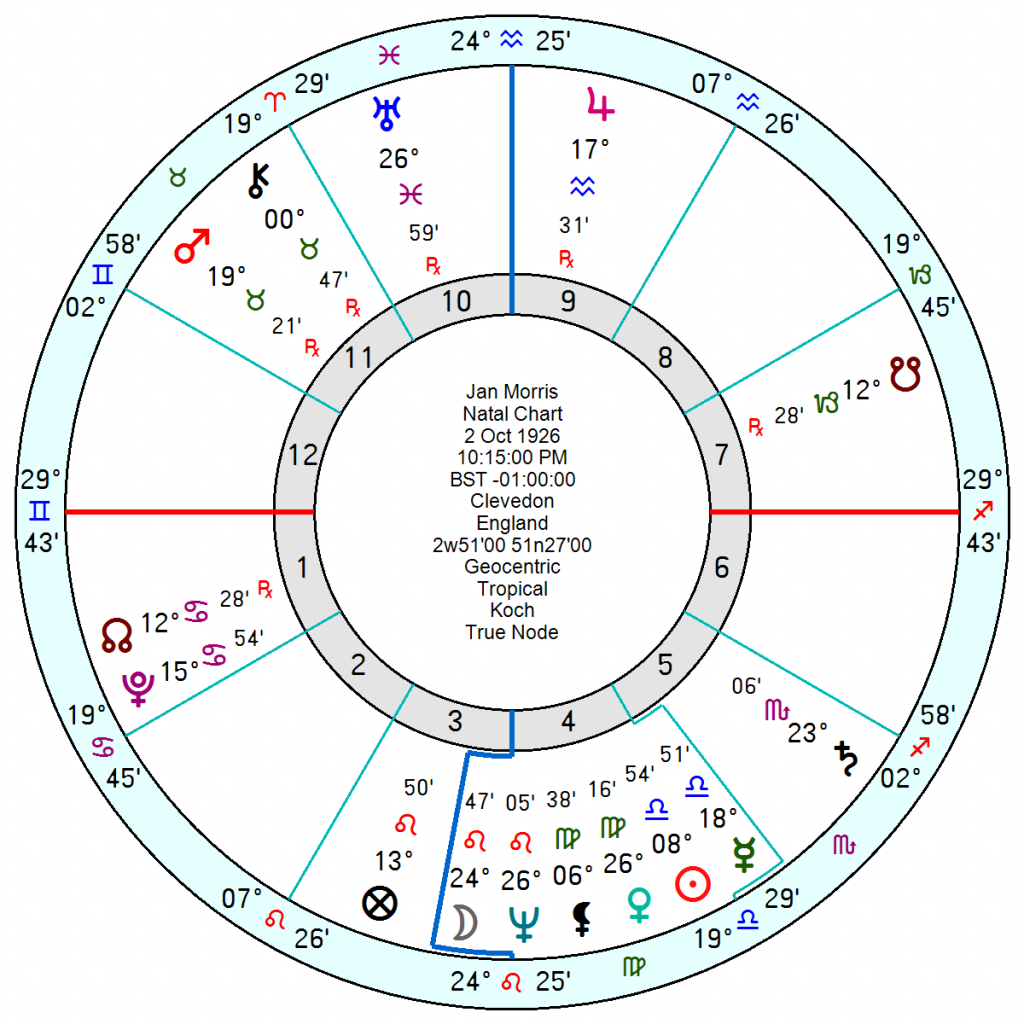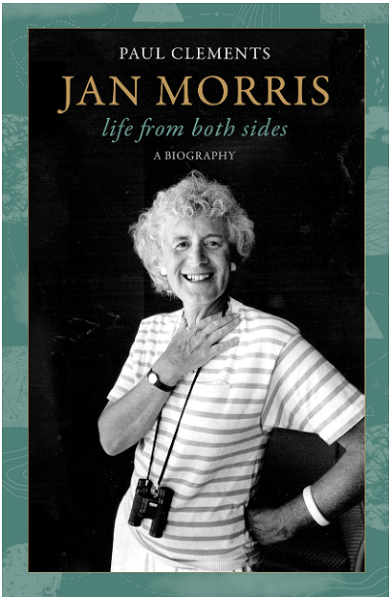

Jan Morris, the celebrated travel writer and author, well known as a transgender pioneer, received glowing obituaries when she died in 2020 aged 94. She led an extraordinary life, a cavalry officer during WW11, marrying and having five children, climbing three-quarters way up Everest to witness Hillary conquer it in 1953, and reporting in Egypt on the Suez crisis with details that led ultimately to Anthony Eden’s resignation as prime minister. And went on to be an acclaimed writer and historian. All this despite having been aware since she was three or four that she’d been born into the wrong body.
Her only daughter Suki Morys has now written a sharply critical remembering of the reality of life at home. “She told the world we were fine, yet she never actually asked us whether we were. She may have been a wonderful writer, but, much though I loved her, she was a lousy parent who damaged all four of her living children one way or another.”
It brings to mind the German phrase – street angel and house devil.
Suki remarks that much of Jan’s memoir Conundrum was fantasy. “She romanticises anything that is remotely emotional, because she never talked about anything emotional.” Talking of the early death of her sister as an infant Jan had described a tear-filled sojourn with her in hospital. Whereas Jan’s wife said when their child was dying Jan refused to visit her and lacked sympathy afterwards.
Suki also suggests that Jan had a sexist view of women, relegating them to house mothers. Suki’s brothers were sent to top schools while she, the only daughter, was constantly moved around and deemed never good enough.
“As I grew older, I couldn’t come to terms with the fact that Jan wanted to be a “woman” when her view of “women” was totally the opposite of what she was. She wasn’t at all maternal; she struggled to even give her own children a hug, stiffening to a board when we tried. She couldn’t cook, I never saw her clean anything and she certainly didn’t want to stay at home and be with her family. She disliked the very idea of “family”. The honest fact is that she didn’t want to be a woman, at least not the way she saw women.”
What stands out from Jan’s chart is a Fixed Grand Square of Mars in Taurus opposition Saturn in Scorpio square Neptune Moon in Leo opposition Jupiter. Mars Saturn suggests a tough childhood which can produce a hard-edged temperament, impatient and unsentimental. That squaring onto Moon Neptune might indicate an idealised view of mother but can also be deceptive and fantasy prone. Jan also had an afflicted Saturn in Scorpio squaring onto Moon Neptune and Jupiter so was completely unbudgeable, over-controlling and obsessive to the nth degree.
Suki suggests Jan’s problems came from a father who never recovered from being gassed during WW1 and his subsequent closeness with his mother – which would make sense of his boundaryless Moon Neptune.
Given her sick father I have given her a 10.15pm birth time though one is not known. It is plausible with Neptune in the 4th and a traveller/writer’s Jupiter in the 9th and a cold Saturn in the 5th house of children. Unfortunately there are no birth dates for any of the children.
Previous Post: 21 November 2020
Jan only started to transition in her forties and eventually underwent reassignment surgery, after which she wrote a well-received book about her experience Conundrum. She remained attached to her wife and although they divorced they remained together and formed a civil partnership.
Born 2 October 1926, no birth time sadly, in Clevedon, England, she was a Sun and Mercury Libra trine Jupiter in Aquarius and square Pluto – so not lacking in confidence or the ability to communicate with insight. What is most striking about her chart is a Fixed Grand Cross of Saturn in obsessively conscientious Scorpio opposition Mars in Taurus square Jupiter opposition Neptune and perhaps Moon in Leo. Mars Saturn has a military connotation and gives discipline and the ability to cope with tough conditions but also suggests an element of unfairness, even cruelty, in childhood. The Jupiter and Neptune would soften the effect. If it was an after noon time birth with the Moon is tied in, it would certainly make the feminine a major issue in life.
Her Venus in workaholic Virgo also opposed Uranus forming a Mystic Rectangle with the Saturn opposition Mars – and having three oppositions in the chart she would have a constant struggle to balance the opposites in her temperament.
Her transition started fittingly enough on the Uranus Pluto in Virgo conjunction of the 1960s – Uranus Pluto pushes the boundaries back, and in Virgo, in particular in the area of health and medicine. But the time of her surgery Pluto had just moved into Libra and tr Uranus was just over the conjunction to her Sun – both bringing profound changes to her identity and life.

The sins of the Fathers visited on the kids – bible saying
Many thanks, Marjorie. I found Suki Morys’ article very moving. The stories of overlooked and invisible children resonate with adults who have experienced a similar style of parenting and childhood.
I thought this was telling, from a more scathing review of Morris’ book earlier this year: “Her second son, Henry, chose to go and live abroad. Asked about Morris after her death, he said: “We were introduced, but we never actually got to know each other.”
I knew someone with a very similar chart to Jan Morris, born in 1926 but a Gemini rather than a Libran, also with a Moon/Neptune conjunction in Leo. I knew this person from childhood onwards and felt the full effects of their dominating and I think most probably narcissistic personality. Their own mother was a devoutly religious termagent who did nothing but criticise and berate her grandchildren. They inherited the the same. One of their daughters had a lifelong eating disorder which has never been tackled because they do not approve of therapy. They sees mental illness as a weakness, ‘not in our family’. And yet their son, the golden child developed an addiction to class As and never thrived. That Saturn in Scorpio is a tough experience and is often harsh and gruelling for the child born with it, including my own father. I’ve seen it in the charts of those born late 1950s too and it’s often connected with war traumatised fathers and loveless childhoods. I don’t think we can underestimate the effect of two World Wars on our collective psychology, and how that affected successive generations and how they were raised and am therefore not surprised to the same applies to Jan’s experience of her own father.
‘Man hands on misery to man’, as the poem goes….
I agree about the two World Wars and our collective psychology VF. Particularly when you think about not only war trauma itself, but all the displaced people, migrants, and the bereaved families left behind in so many nations.
Regarding Jan Morris’s chart – I think the Moon Neptune inconjunct Uranus is quite telling. It would unsettle feelings around femininity, motherhood and mothers, and home. She might find a daughter very hard to relate to. Hard to know how she and her wife really got on, or how it was they had so many children. The Moon Neptune and Uranus could need many adjustments throughout life. The disruptions of Uranus might lead, as Marjorie writes, to an internal struggle:
“It brings to mind the German phrase – street angel and house devil.”
As for poetry….I was reminded of Phillip Larkin’s “They f*** you up, your mum and dad. They may not mean to, but they do.”
At an eating problem workshop I attended in the 70’s, I was appalled by the number of women whose sisters had committed suicide. We were all around 20/30 years old, with ‘50’s childhoods. I realized that mine was not the only one filled with anger, disappointment and Thoreau’s quiet desperation.